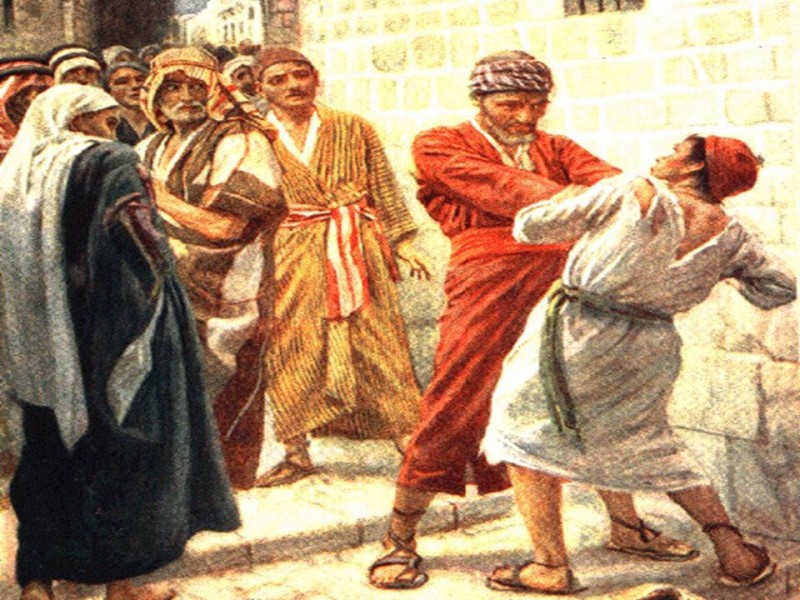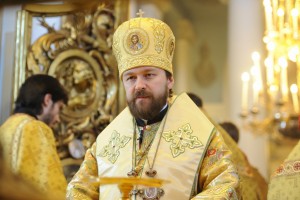Matthew 18:23-35
Therefore is the kingdom of heaven likened unto a certain king, which would take account of his servants. And when he had begun to reckon, one was brought unto him, which owed him ten thousand talents. But forasmuch as he had not to pay, his lord commanded him to be sold, and his wife, and children, and all that he had, and payment to be made. The servant therefore fell down, and worshipped him, saying, Lord, have patience with me, and I will pay thee all. Then the lord of that servant was moved with compassion, and loosed him, and forgave him the debt. But the same servant went out, and found one of his fellowservants, which owed him an hundred pence: and he laid hands on him, and took him by the throat, saying, Pay me that thou owest. And his fellowservant fell down at his feet, and besought him, saying, Have patience with me, and I will pay thee all. And he would not: but went and cast him into prison, till he should pay the debt. So when his fellowservants saw what was done, they were very sorry, and came and told unto their lord all that was done. Then his lord, after that he had called him, said unto him, O thou wicked servant, I forgave thee all that debt, because thou desiredst me: Shouldest not thou also have had compassion on thy fellowservant, even as I had pity on thee? And his lord was wroth, and delivered him to the tormentors, till he should pay all that was due unto him. So likewise shall my heavenly Father do also unto you, if ye from your hearts forgive not every one his brother their trespasses.
“Forgive us our trespasses as we forgive those who trespass against us.” Thus Jesus taught His disciples to pray and in praying to forgive. Forgiveness is a gift little understood outside of the household of God. In the world an offense may be forgotten, but is rarely forgiven. Forgiveness is the language that God has given to us in order to elevate us beyond our tit-for-tat fallen relationships in order that we may truly find healing and become God-like.
In our earthly relationships, it’s easy to begrudge and grow bitter, it’s easy to want to write off those who’ve offended us. Forgiveness, on the other hand, takes great courage and trust in God to submit ourselves and our earthly relationships to Him.
Bitterness and grudges are like getting bit by a snake over and over again. Whatever the initial harm that’s been done to us or another—whether real or perceived—our growing bitterness and holding a grudge against that person means that we continue to nurse the same old wound, over and over again. We keep that wound, we keep ourselves from healing, from loving. Often, whatever the initial offense or hurt, our dwelling on it, our cultivating enmity against the person, will grow the hurt or offense into something much bigger than it originally was; it will take on a life of its own, and become a means through which the enemy does us further harm.
The truth is that when we’re bitter, nursing a grudge, we turn someone else’s sin into our own sin and it eats at us like some spiritual cancer; if unchecked, it grows, infecting our souls, and destroys our faith as it alters our sense of reality. We cannot be close to God, we cannot maintain and grow our relationship and communion with God, while holding onto bitterness, while withholding forgiveness.
For this reason, God in His great love for us, desires our freedom from this spiritual cancer, desires our healing from bitterness, grudges, enmity, and strife. So, when St. Peter asks the Lord how many times we must forgive, thinking maybe seven times would be sufficient, the Lord replies, ”seventy times seven” (Matt. 18:22), symbolic of an infinite sum.
The premise of this infinite forgiveness comes from God, Who grants forgiveness to us over and over and over again. And while we ourselves sin and then fight to forgive those who wrong us, God does not sin and yet He forgives us for our sins against Him and others.
To illustrate this truth, Christ gives us today’s parable: One of the Master’s servants owes him an incredible amount, ten thousand talents, an impossible sum. If we thought of God’s forgiveness towards us in terms of a debt to be paid, we’d never be able to settle such an account, which is why we call God’s salvation, “grace.” The servant is forgiven as God forgives us our trespasses, our disobedience, pride, lustfulness, unfaithfulness. But the servant, having received that gracious gift of forgiveness of his debts immediately takes his fellow servant by the throat, demanding that he pay all his debts, which by comparison with his own debts, are a pittance.
So it is with us by comparison. We withhold forgiveness from our fellow man and yet we come to expect that no matter what, God will forgive us. We presume on God’s grace. The Lord warns us that this shall not be. We cannot claim relationship and communion with God while withholding forgiveness from each other.
When the Master finds out what the wicked servant has done, throwing his fellow servant into prison, failing to forgive his debt, the Master grows angry. Jesus warns us, “So My heavenly Father also will do to you if each of you, from his heart, does not forgive his brother his trespasses.” And so, Christ teaches His disciples to pray, “forgive us our trespasses as we also forgive those who trespass against us.” This teaching is at the heart of the Gospel; it goes to the core of what the Body of Christ is meant to be about: forgiving one another from the heart.
The question we then have to ask ourselves is: How can we expect God to forgive us if we withhold our forgiveness of others? That would be hypocrisy. Yet, forgiving others can often be a deep struggle, particularly in the cases of abuse or other deep and painful wounds.
Forgiveness is not the same as forgetting. We may never forget a wrong, abuse, some grievous sin done against us, but we can with God’s help, learn to forgive and practice ongoing forgiveness. In other words, we can make it a matter of prayer that God help us to forgive someone on an ongoing basis. We can pray that God heal us of our bitterness, our grudges, our enmity against others. Indeed, if this is a struggle for us, we can pray this prayer as part of our daily prayers, even beseeching God to lift its weight from us. God’s healing in this regard begins with the desire to want to learn to forgive others as God has forgiven and does forgive us.
Along with active forgiving, we need to strive to keep “short accounts.” That is, rather than nurse wounds and build grudges and bitterness, withholding forgiveness, or spreading gossip or mistrust, we can learn to go to the person who has offended us to speak to them about it. We then give that person an opportunity to explain, ask forgiveness, and reconcile with us, and us with them. But even if the person doesn’t offer to apologize, we still need to learn how to forgive. Similarly, if you’re on the receiving end of someone else’s anger, even if you can’t figure out what you did wrong, or if the person has misjudged you or your intensions, it’s still better to humble oneself and ask forgiveness.
We can all cultivate being slow to speak, slow to anger, and quick to forgive. St. Paul admonishes us to “be kind to one another, tenderhearted, forgiving one another, even as God in Christ forgave you” (Ephesians 4:22).
In this way, we’ll learn to combat bitterness and grudges before they start setting root and we’ll grow free of this spiritual cancer in our local body of the Church. We’ll demonstrate the love and forgiveness that’s not of this world, but which is, rather, indicative of that higher calling of being a citizen of the Kingdom of Heaven. In His love for us, in His desire to save us, free us, heal us, Christ commands us to forgive as we have been forgiven, and by the power of the Holy Spirit’s work in us and through us, He gives us the means to do so.
Source: Holy Archangels Orthodox Church




















